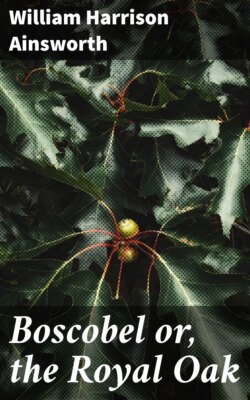Читать книгу Boscobel or, the Royal Oak - William Harrison Ainsworth - Страница 15
На сайте Литреса книга снята с продажи.
CHAPTER XI.
Colonel Roscarrock relates how the
Earl of Derby was routed at Wigan
ОглавлениеTable of Contents
Ill news came to Charles on the morrow.
He was in his cabinet with his secretary, Captain Fanshaw, when Careless entered and informed him that Colonel Roscarrock was without.
"Roscarrock!" exclaimed the king, struck by Careless's looks. "What news brings he from the Earl of Derby?"
"Ask me not, I beseech you, my liege," rejoined Careless, sadly. "The colonel will tell his own tale. I grieve to say he is wounded."
Comprehending at once what had occurred, Charles merely said, "Bring in Colonel Roscarrock."
And as the aide-de-camp departed, he arose and paced the cabinet with anxious steps, trying to summon his firmness for the painful interview.
Presently Careless returned supporting the colonel, whose left arm was in a sling.
Roscarrock was a tall, soldier-like, handsome man, but loss of blood and excessive fatigue gave a haggard expression to his features. The dusty state of his apparel and boots showed that he had ridden far.
"Alas, sire, I bring you bad news!" he exclaimed, in dolorous accents.
"Be seated, colonel, and I will hear you," said Charles, aiding him to a chair. "We have sustained a defeat, I perceive, but ere you enter into details, relieve my anxiety respecting the Earl of Derby."
"His lordship is sore hurt," replied Roscarrock, "but he is in safety, and will be with your majesty ere many days."
"Thank Heaven for that!" exclaimed Charles, earnestly.
"You have lost many loyal subjects and brave soldiers, sire," pursued Roscarrock. "Lord Widdrington is mortally wounded, if not dead. Sir William Throckmorton cannot survive. Sir Thomas Tildesley, Colonel Boynton, Colonel Trollope, and Colonel Galliard are slain."
"Alas! brave Widdrington! Alas! brave Tildesley! have I lost you?" ejaculated Charles, mournfully. "Where did this dire disaster occur?"
"At Wigan, in Lancashire, my liege," returned Roscarrock. "At first, everything promised success. As your majesty's lieutenant, the Earl of Derby had issued his warrant commanding all your loyal subjects to meet him in arms at Preston, and he had collected six hundred horse and about nine hundred foot. With this force he marched to Wigan, with the design of proceeding to Manchester, where he not only hoped to surprise Cromwell's regiment of infantry but expected to obtain five hundred recruits. I need not tell your majesty that I was with his lordship. In a lane near the town we encountered Colonel Lilburn with a regiment of horse. Our men shouted loudly as we dashed upon the enemy, and fought so well that they drove Lilburn to the end of the lane. But a reserve of horse coming up changed the fortune of the day. What could our raw recruits do against Lilburn's veterans? Owing to the earl's reckless daring, he was wounded early in the conflict, which lasted upwards of an hour. How can I relate the disastrous issue? Suffice it, the rout was total. Our men were panic-stricken, and could not be rallied. Hundreds were slain in flight. Pursued by a party of horse, the earl dashed into Wigan, and turned into a narrow street. Observing an open door, he flung himself from his steed and entered the house. A woman recognised him, and barred the door, enabling him to escape through a garden at the back before the Roundheads could search the house. By a miracle almost the noble fugitive got out of the town, which was filled with Parliamentary soldiers, and shaped his course towards the south. I was proceeding slowly in the same direction, when Providence—for I like not to call it chance—brought us together near Newport. At the house of a Royalist gentleman named Watson, we met another true man, Mr. Snead, who volunteered to conduct us to a lonely house called Boscobel, standing on the borders of two counties—Shropshire and Staffordshire—where we could remain safely hidden till our wounds were healed. We gladly accepted the offer. I rested one night at Boscobel, when feeling able to proceed to Worcester, I came on. Lord Derby was too weak to accompany me, but bade me say that your majesty may count on seeing him in a few days."
"I thought to see him with two thousand men at his back," exclaimed Charles, in a melancholy and somewhat despondent tone. "But the hope ought never to have been indulged. Treat it as we may, Roscarrock, this defeat at Wigan is a heavy blow to our cause. 'Twill encourage the enemy, and dishearten our own troops. Lilburn will join Cromwell."
"He has already joined him, sire, with his regiment of horse," remarked Roscarrock. "I should have been here before, had I not experienced much difficulty in getting nigh Worcester, owing to the enemy's numerous outposts. Would I had a sword like Widdrington's, and an arm like his to wield it!" he continued, with a grim smile. "Widdrington cut down half a dozen dragoons ere he was overpowered. In losing him your majesty has lost the tallest of your subjects, and the strongest."
"But not the bravest, while hardy Ned Roscarrock is left me," said Charles. "But you need refreshment and rest, colonel, and you must have both, or you will never be able to fight for me, and I may call upon you to attack Lilburn again before long."
"Your majesty will find me ready, call on me when you will," returned Roscarrock.
With Careless's assistance he then arose and withdrew, leaving the king alone with his secretary.
